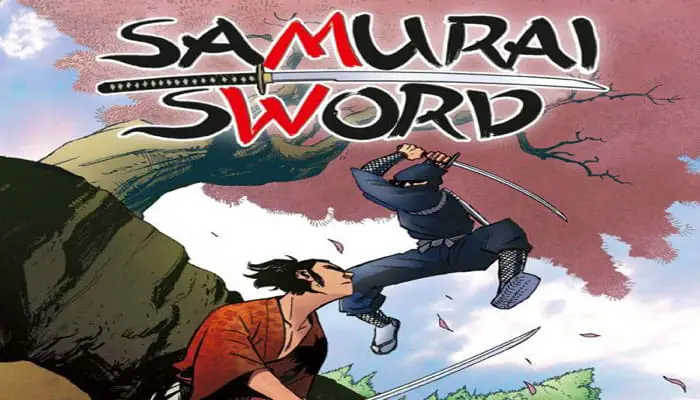
In the land of the Rising Sun, faithful Samurai protect the Shogun-their commander and lord. Cunning Ninja try to undermine the Empire, by fair means or foul.
The katana blade sparkles on the battlefield as a lonely Ronin prepares for the struggle, plotting his revenge. Can you find your enemies while honoring the way of the warrior?
Components

- 7 Role cards
- 12 Character cards
- 32 Weapon cards
- 15 Property cards
- 43 Action cards
- 1 summary card
- 30 Honor Points
- 36 Resilience Points
- Rulebook
Object of the Game
Players are divided into three (secret) teams:
- The Shogun and Samurai team (the number of Samurai depends on the number of players);
- The Ninjas (2 or 3 according to the number of players);
- The Ronin, who always plays for himself.
For each team, the aim of the game is to gather the most Honor Points or to have the last man standing.
Setup
Note: the following rules are for 4-7 players. Special rules for 3-player games are included at the end of the rules.
Take a number of Role cards as follows:
- 4 players: 1 Shogun, 1 Samurai, 2 Ninja (remove from the game one of the 3 Ninjas at random, without looking at it)
- 5 players: 1 Shogun, 1 Samurai, 1 Ronin, 2 Ninja
- 6 players: 1 Shogun, 1 Samurai, 1 Ronin, 3 Ninja
- 7 players: 1 Shogun, 2 Samurai, 1 Ronin, 3 Ninja
-
Shuffle the Role cards and deal one to each player, face down. The Shogun must reveal his card and keeps it face up. All other players look at their role, but must keep it secret.
-
Shuffle all 12 Character cards and deal one to each player, face up. Each player announces the name of his character and reads his special ability aloud.

Each player takes as many Resilience Points as the number shown on his Character card and places them on his card. Keep the unused Resilience Points handy in a heap in the middle of the table. Return the unused Role and Character cards to the box.
-
The Shogun takes 5 Honor Points. Each of the other players takes 4 Honor Points (only 3 Honor Points if playing with 4 or 5 players). Place your Honor Points on your Role card. Return the unused Honor Points to the box.
-
Shuffle the 90 playing cards and deal cards to each player in clockwise order as follows:
- Shogun: 4 cards
- 2nd and 3rd player: 5 cards
- 4th and 5th player (if present): 6 cards
- 6th and 7th player (if present): 7 cards
This is your starting hand. The remaining cards form a draw deck in the middle of the table. Leave space for a discard pile.
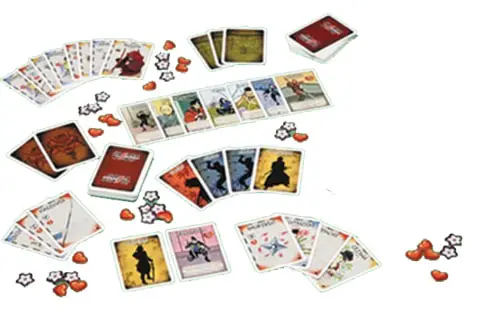
The Characters
Your character has a unique special ability (note: "character" and "player" will be used interchangeably in these rules). Each character also has a Resilience value, which tells you how many wounds you may suffer before being "Defeated".
Harmless Characters
You are considered "Harmless" in either of these situations:
- You have no Resilience Points; or
- You have no cards in your hand.
If you are Harmless:
- you cannot be the target of Weapon cards
- you are unaffected by the Action cards Battle Cry and Jujutsu
- you are not counted when determining the Difficulty of an attack
Other than that, you are still "in play" for all purposes.
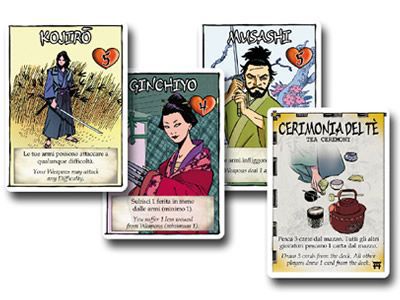
Game Play
The game is played in turns in clockwise order. The Shogun begins.
Your turn is split into 4 phases, which you must play in order:
- Recover: recover all of your Resilience Points, if you have none;
- Draw: draw 2 cards;
- Play: play any number of cards;
- Discard: discard excess cards.
1. Recover
If you have zero Resilience Points, you recover all of them. Take the number of Resilience Points listed on your Character card and place them on the card. If you have one or more Resilience Points, skip this phase.
2. Draw
Draw the top two cards from the deck. If the deck is empty, follow the rules in End of the Deck.
3. Play
You may now play cards from your hand, to help yourself or against the other players, trying to defeat those you think belong to a different team. You do not have to play any cards during this phase.

Weapon cards are used to attack another character, and are then discarded.

Action cards have an immediate effect when played, and are then discarded.

Property cards have long-lasting effects, and are played face up in front of you where they remain until a game effect forces you to discard them (e.g., the Geisha card).
You may play as many cards as you want, with the following exception: You can only play one Weapon card per turn.
The effect of each card is shown on the card itself and is explained in the following sections.
Note: You can only play cards during your turn, except cards with the parry symbol  (see Weapons and Parries).
(see Weapons and Parries).
4. Discard
At the end of your turn, your hand size limit is 7 cards. If you have more than 7 cards in your hand, you must discard down to seven.
Now your turn ends, and play passes to the player on your left.
Note: You may talk freely during the game, which is good for "bluffing" your Role (which must be kept secret until the end of the game!).
However, you may never ask other players about the cards in their hand, or whether a card in your hand will hurt them or not.
Attack Difficulty

In order to target another character wi a Weapon card, you must first check t Difficulty.
The Difficulty to attack a charact is equal to the minimum number of places between the two characters, clockwise counterclockwise, as shown in the picture.
If a character is Harmless, he is not counted when you check the Difficulty of an attack. So, some characters may become "easier" targets temporarily because someone is Harmless.
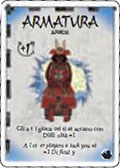
The Armor card changes the Difficulty when other players target you with an attack.
Each Armor card you have in play increases their Difficulty by 1. You can attack the other players at the normal Difficulty.
Example: Player A has 2 Armor cards, so players B and F have Difficulty 3 if they attack A, C and E have Difficulty 4, and D has difficulty 5. But, player A can attack the other players with the normal Difficulty shown in the picture.
Weapons and Parries
The main way to deal wounds to other characters is to attack them by playing a Weapon card.

Each Weapon card shows two numbers: The top number shows the maximum Difficulty you may attack with that card; the lower number shows how many wounds that Weapon will deal if it hits.
If you want to play a Weapon card to attack another character, you must:
- Check the Difficulty for the target character; and
- Check if your Weapon is good enough to equal or beat that Difficulty.
Remember: You can never play a Weapon card against a Harmless character!

If you are the target of a Weapon card, you may immediately play a parry (a card with the  symbol), even though it is not your turn, to parry the attack. A parried attack has no effect and deals no wounds.
symbol), even though it is not your turn, to parry the attack. A parried attack has no effect and deals no wounds.

If you do not parry, the Weapon hits and you lose the number of Resilience Points shown on the Weapon card.
If you lose your last Resilience Point, you are "Defeated" and become Harmless. If you are Defeated, any excess wounds are ignored.
Discarded Resilience Points go back to the central pile. The Weapon is then discarded, whether the attack was parried or not.
Note: You may only parry attacks that target you.
Example: Player A wants to attack player D. An attack from A to D has a Difficulty of 3 (D has no armor), so A will need a strong Weapon such as a Daikyu, Nodachi, or Naginata. A Bo or Wakizashi will not be enough. If D did have an Armor card, the Difficulty would increase to 4, and even a Nodachi wouldn't be enough!
Player A uses her Daikyu card to attack. D does not play a parry  , so he suffers 2 wounds: he will be Defeated unless he had at least 3 Resilience Points before he was attacked!
, so he suffers 2 wounds: he will be Defeated unless he had at least 3 Resilience Points before he was attacked!
Defeating a Player
If you lose your last Resilience Point, you are "Defeated"! You must give one of your Honor Points to the player who Defeated you.
This also applies to the Action cards Battle Cry or Jujutsu. If you now have no Honor Points left, the game ends immediately (see End of the Game).
If you are Defeated, you become Harmless until the beginning of your next turn.
Other Cards
The golden rule: whenever a card contradicts the rules, the card takes precedence!

Battle Cry: Each of the other players chooses to play a parry or suffer 1 wound. Harmless players are not affected by the Battle Cry.
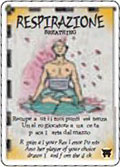
Breathing: You regain all your lost Resilience Points (i.e., you heal all of your wounds).
Then, 1 other player of your choice (not you!) draws 1 card from the deck. You cannot heal other players. Breathing can be played even if you have all of your Resilience Points.
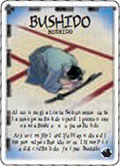
Bushido: Play this card in front of any player, regardless of Difficulty and even if he is Harmless.
If Bushido is in front of you at the end of your Recover Phase, you must flip Ssr over and discard the top card in the deck. The effect of Bushido depends on the card you turn over:
If it is a Weapon: you must either discard a Weapon card from your hand or discard 1 Honor Point (to the box). If you discard a Weapon, Bushido is passed to the player on your left (who must make the same check on his turn). If you instead lose 1 Honor Point, Bushido is discarded;
If it is not a Weapon: Bushido is passed to the player on your left, who must make the same check on his turn (and so on).
In both cases, your turn is then played as normal. Only 1 Bushido in play is allowed: you cannot play Bushido if another Bushido card is already in play.
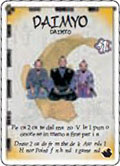
Daimyo: You may play this card to draw 2 cards from the deck.
However, if this card is in your hand at the end of the game it is worth 1 Honor Point. Daimyo Honor points are never doubled or tripled. Daimyo cards in the Ronin's hand are worth 0 Honor Points. '
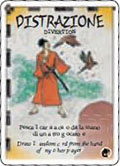
Diversion: Draw 1 random card from the hand of any other player (regardless of Difficulty) and add it to your hand.
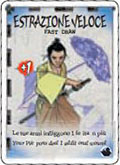
Fast Draw: When you hit another character with a Weapon card, you deal 1 additional wound for each Fast Draw you have in play.
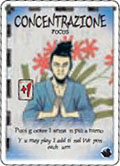
Focus: On your turn, you may play 1 additional Weapon card for each J Focus you have in play.
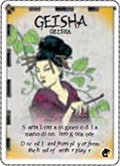
Geisha: Force 1 player to discard 1 card (regardless of Difficulty). You I may choose any Property card in play, or one drawn randomly from the I _ player's hand.
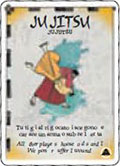
Jujutsu: Each of the other players chooses to play 1 Weapon card or suffer 1 wound. Harmless players are not affected by the Jujutsu.
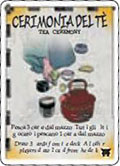
Tea Ceremony: Draw 3 cards from the deck. Each of the other players [ draws 1 card from the deck.
End of the Deck
When the draw deck runs out of cards, re-shuffle the discard pile and form a new draw deck. At the same time, each player must discard 1 Honor Point back into the box (this may cause the end of the game, see below).
End of the Game
At any time, if one or more players have no Honor Points left, the game ends immediately. All players now reveal their Role cards and add up their score.
Your score is equal to the number of Honor Points you have, multiplied by a bonus that depends on your Role and the number of players in the game, as shown here:
| 3 players | 4 players | 5 players | 6 players | 7 players | |
|---|---|---|---|---|---|
| Shogun | x 2 | x 1 | x 1 | x 1 | x 1 |
| Samurai | - | x 2 | x 1 | x 2 | x 1 |
| Ninja | x 1 | x 1 (fewer stars) x 2 (more stars) | x 1 | x 1 | x 1 |
| Ronin | - | - | x 2 | x 3 | x 3 |

(Ninjas have 1, 2 or 3 stars. With 4 players, only the Ninja with more stars doubles his points).
You can also score points for:
Darmyo cards: Each Daimyo in your hand is worth 1 Honor Point (unless you are the Ronin). Daimyo points are never doubled or tripled. Daimyo cards in the Ronin's hand are worth 0 Honor Points.
Deadly Strike: If the game ends because you were defeated by a player on your team, your team suffers a penalty of 3 Honor Points.
Now, add up the score for all players on your team: The Shogun adds his points together with the Samurai(s); Ninjas add their points together; the Ronin plays alone.
The team with the highest score wins a "Victory of Honor"! If there is a tie between the Ninjas and any other team, the Ninjas win. If there is a tie between the Shogun and Samurai team and the Ronin, the Shogun/Samurai team wins.
Example: At the end of a 6-player game, the Shogun has 1 Honor Point, the Samurai has 3, the Ronin has 3, and the Ninjas have 2, 3, and 0. The Shogun/Samurai team scores 1 + (3x2) = 7 points.
The Ninja team scores 2 + 3 + 0 = 5 points. The Ronin scores 3x3 = 9 points, so it looks like he's going to win. But, both the Samurai and the Shogun each have 1 Daimyo card in their hands, so the total for their team is 7 + 1 + 1 = 9 points.
Since they are tied with the Ronin, they win!
Victory of the Swordmaster
If at any time there is only one player with any Resilience Points, the game ends immediately, and that player's team wins the game. This special victory is called a "Victory of the Swordmaster".
Important: The Victory of the Swordmaster is not awarded if the game ends because a player was Defeated by a member of his own team! (The game ends anyway, but count your scores as above).
Special Rules for 3 Players
One player is randomly dealt the Shogun card. The other two players are Ninjas. The Shogun begins with 6 Honor Points, and each Ninja starts with 3 Honor Points. The game is played as normal, with the following exceptions:
The Shogun draws 1 additional card per turn during his draw phase (normally, 3 cards instead of 2).
The Shogun may play an additional Weapon card during his turn (normally, 2 cards instead of 1).
The Shogun doubles his Honor Points at the end of the game.
The Shogun never loses an Honor Point due to Bushido. If he has to, he just discards the Bushido.
The Victory of the Swordmaster does not apply.
Continue Reading

